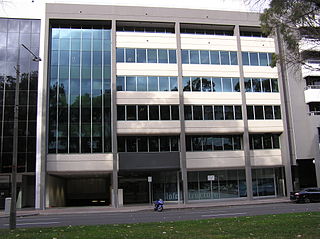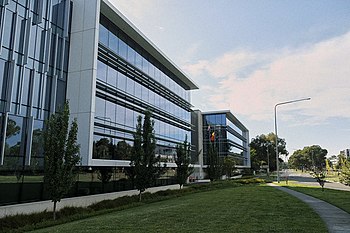
The treasurerof Australia, also known as the Federaltreasurer or simply the treasurer, is the minister of state of the Commonwealth of Australia charged with overseeing government revenue collection, federal expenditure and economic policy as the head of the Department of the Treasury. The current treasurer is Jim Chalmers, who was selected by Prime Minister Anthony Albanese in May 2022 following the 2022 Australian federal election.

The ministerfor Defence, also known as the Defence minister, is the minister of state of the Commonwealth of Australia charged with overseeing the organisation, implementation, and formulation of strategic policy in defence and military matters as the head of the Department of Defence. The Defence minister directs the government’s approach to the Australian Defence Organisation and the Australian Defence Force. The current Defence minister is Richard Marles, who is concurrently serving as deputy prime minister of Australia, he was selected by Prime Minister Anthony Albanese in May 2022 following the 2022 Australian federal election.

The Minister for Finance in the Government of Australia is responsible for monitoring government expenditure and financial management. The current minister is Senator Katy Gallagher who has held the position since May 2022.
The Australian Department of the Environment was a department of the Government of Australia that existed between September 2013 and July 2016. The department was charged with responsibility for developing and implementing national policy, programs and legislation to protect and conserve Australia's environment and heritage.

The Department of Immigration and Border Protection (DIBP) was a department of the Government of Australia that was responsible for immigration, citizenship and border control. It has now been subsumed into the Department of Home Affairs, which combines its responsibilities with a number of other portfolios.

The Department of Foreign Affairs and Trade (DFAT) is the department of the Australian federal government responsible for foreign policy and relations, international aid, consular services and trade and investment. Australia's total official development assistance (ODA) decreased in 2022 due to differences in Australia's financial year reporting and the timing of its COVID-19-related expenditure, representing 0.19% of gross national income (GNI).

The former Australian Department of Families, Housing, Community Services and Indigenous Affairs (FaHCSIA) was a department of the Australian Government located in Greenway in Canberra. It was formed in 2007 and absorbed the former Department of Families, Community Services and Indigenous Affairs. As a result of an Administrative Arrangements Order issued on 18 September 2013, the Department of Social Services was established and assumed most of the responsibilities of FaHCSIA; with indigenous affairs functions assumed by the Department of the Prime Minister and Cabinet.

The Attorney-General's Department, also known as the Department of the Attorney-General or AG’s Department, is the national law enforcement and justice department of the federal government of the Commonwealth of Australia. The attorney-general’s department is responsible for the enforcement and compliance of federal law, the administration of justice and the oversight of industrial relations affairs. The department oversees various agencies including the Australian Federal Police (AFP), the national Human Rights Commission (AHRC) and the Commonwealth Director of Public Prosecutions.
Defence Australia is a department of the Government of Australia charged with the responsibility to defend Australia and its national interests. Along with the Australian Defence Force (ADF), it forms part of the Australian Defence Organisation (ADO) and is accountable to the Commonwealth Parliament, on behalf of the Australian people, for the efficiency and effectiveness with which it carries out the Government's defence policy.
The Department of the Prime Minister and Cabinet (PM&C) is an Australian Government public service central department of state with broad ranging responsibilities, primary of which is for intergovernmental and whole of government policy coordination and assisting the prime minister of Australia in managing the Cabinet of Australia. The PM&C was established in 1971 and traces its origins back to the Prime Minister's Department established in 1911.

The Department of Infrastructure, Transport, Regional Development and Cities was an Australian Public Service department of the Government of Australia that existed between December 2017 and May 2019, charged with the responsibility for infrastructure and major projects, transport, local government, external territories administration, rural and regional development, population policy, and cities.
The machinery of government is the interconnected structures and processes of government, such as the functions and accountability of departments in the executive branch of government. The term is used particularly in the context of changes to established systems of public administration where different elements of machinery are created.

The Australian Public Service (APS) is the federal civil service of the Commonwealth of Australia responsible for the public administration, public policy, and public services of the departments and executive and statutory agencies of the Government of Australia. The Australian Public Service was established at the Federation of Australia in 1901 as the Commonwealth Public Service and modelled on the Westminster system and United Kingdom's Civil Service. The establishment and operation of the Australian Public Service is governed by the Public Service Act 1999 of the Parliament of Australia as an "apolitical public service that is efficient and effective in serving the Government, the Parliament and the Australian public". The conduct of Australian public servants is also governed by a Code of Conduct and guided by the APS Values set by the Australian Public Service Commission.
The Department of Regional Australia, Local Government, Arts and Sport was an Australian government department. It was formed in December 2011, absorbing the former Department of Regional Australia, Regional Development and Local Government along with Arts and Sport functions from the Department of the Prime Minister and Cabinet. The department was abolished in September 2013 with its functions moved to other Australian Government departments.

The Department of Infrastructure and Transport was an Australian government department. It was formed in September 2010, following the federal election in August 2010. The department absorbing parts of the Department of Infrastructure, Transport, Regional Development and Local Government. Regional development and local government functions were sent to the Department of Regional Australia, Regional Development and Local Government. Following the 2013 federal election, the department was renamed on 18 September 2013 to become the Department of Infrastructure and Regional Development, regaining regional development and local government functions.

The Department of Social Services (DSS) is a department of the Government of Australia charged with the responsibility for national policies and programs that help deliver a strong and fair society for all Australians. The department develops and implements social policy.

The Australian Department of Finance and Deregulation was a Federal Government department that existed between December 2007 and September 2013. Its role was to help the Australian Government achieve its policy objectives by contributing to four key outcomes:
- sustainable Government finances;
- more efficient Government operations;
- efficiently functioning Parliament; and
- effective and efficient use of information and communication technology by the Australian Government.
The Department of Finance and Administration was an Australian government department tasked to contribute to sustainable Government finances; improved and more efficient Government operations; and efficiently functioning Parliament. The Department existed between October 1997 and December 2007, operating under the Howard government.

The Department of Infrastructure and Regional Development was an Australian government department that existed between September 2013 and December 2017. Matters dealt with by the department included: infrastructure planning and coordination; transport safety; land transport; civil aviation and airports; maritime transport including shipping; administration of Australian territories; constitutional development of the Northern Territory and the Australian Capital Territory; regional programs; regional development; local government matters; and regional policy.









